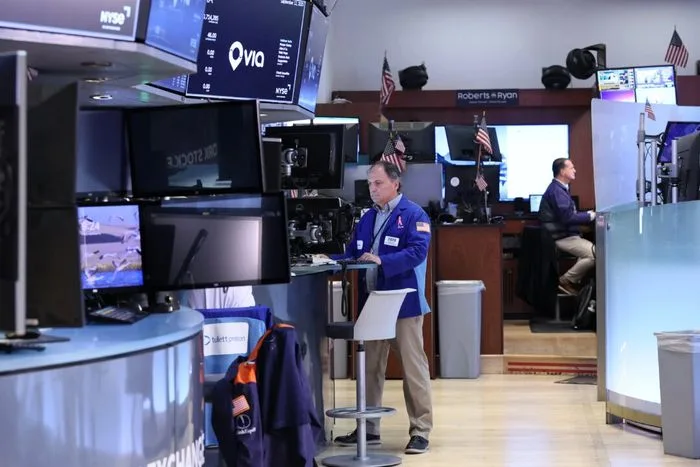By Panos Mourdoukoutas
Stocks hit multiple records this week, lifted by robust revenue guidance from tech giant Oracle, steady bond yields, and a flurry of IPOs that eased concerns over market valuation.
Meanwhile, mixed inflation headlines and another weak labor market report, which reinforced the prospect of an imminent interest rate cut by the Federal Reserve next week, also added to bullish sentiment.
The Dow Jones Industrial Average ended the week on Sept. 12 at 45,834—after hitting a record the previous day—up by 0.95 percent for the week. The S&P 500 Index closed at 6,584, up by 1.59 percent for the week after reaching another high during the session.
The technology-heavy Nasdaq led the gains, advancing 2.03 percent to a record close of 22,141, while the small-cap Russell 2000 extended its weeks-long winning streak with a 0.25 percent gain.
Market volatility, as measured by the Chicago Board Options Exchange’s Volatility Index, dropped below 15, indicating a growing confidence among equity market participants over the bullish direction of equities.
After flirting with record highs the previous week, stocks opened on Sept. 8 on a positive note, led by semiconductors, which gained momentum following Broadcom’s strong earnings report.
However, gains in the first two trading sessions of the week were muted as traders and investors stayed on the sidelines ahead of Oracle’s earnings on Sept. 9 after the market close, and the August inflation data due later in the week.
On Sept. 10, the bulls raced out of the gate following strong guidance by Oracle the previous afternoon, thanks to robust demand for its cloud services business from AI customers.
The tech giant expects its cloud infrastructure revenue to grow 77 percent to $18 billion this fiscal year—and then increase to $32 billion, $73 billion, $114 billion, and $144 billion over the subsequent four years.
In the forward-looking world of Wall Street, Oracle’s guidance headline supercharged the tech industry, pushing the shares of the company and other AI-related stocks higher for the rest of the week.
Adding fuel to the rally were four headlines on the state of the U.S. economy, helping the bond yields remain steady during the week.
The first two provided a mixed picture of inflation. The producer price index (PPI), a measure of wholesale inflation, slowed to an annual rate of 2.6 percent in August, down from a downwardly revised 3.1 percent in July, and well below market forecasts of 3.3 percent.
The consumer price index (CPI), a measure of consumer inflation, rose 2.9 percent year over year in August, the highest since January, after holding steady at 2.7 percent in June and July, in line with market forecasts.
The third report provided further evidence of a rapidly weakening labor market. Initial jobless claims jumped by 27,000 from the previous week to 263,000 in the first week of September—the highest since October 2021 and above the market consensus of 235,000.
The fourth report provided some evidence on the impact of elevated inflation on consumers. The University of Michigan consumer sentiment dropped to 55.4 in September, down from 58.2 in August and lagging market forecasts of 58.
The September reading marked the second consecutive monthly decrease, pushing sentiment to its lowest level since May, with declines most substantial among lower- and middle-income households.
While the combination of mixed inflation numbers and weakness in the labor market was bad news for Main Street, it was good news for the bond market, helping bonds remain steady during the week.
The 10-year U.S. Treasury yield began trading on Sept. 8 at 4.1 percent and ended the week at 4.07 percent, helping support equities.
Meanwhile, the continued weakening of the labor market further boosted the probability of an interest rate cut by the central bank at its regular policy meeting next week.
Another positive for equity market bulls was a flurry of new stocks hitting the market, including Karman Holdings, which surged 36 percent on its Sept. 8 debut, and Gemini and Figure Technology, which rose 14.5 percent and 24 percent, respectively, on their Sept. 12 debuts.
Still, Chris Kampitsis, managing partner of Elmsford, New York-based Barnum Financial Group, remains skeptical about the sustained rally in equities and rising investor confidence amid a weakening economy.
“The stock market now feels disconnected, with stocks inching higher and on pace to clock double-digit gains for the full year, while there is increasing evidence of trouble on Main Street with rising inflation and a steep slowdown in hiring,” Kampitsis told the Epoch Times.
“Our message to investors is to take a barbell approach to investing. While it’s important to maintain exposure to what has worked in this market, such as big tech stocks, that shouldn’t come at the expense of having cash on hand and being invested in defensive sectors like utilities, to navigate any short-term seasonal volatility.”





